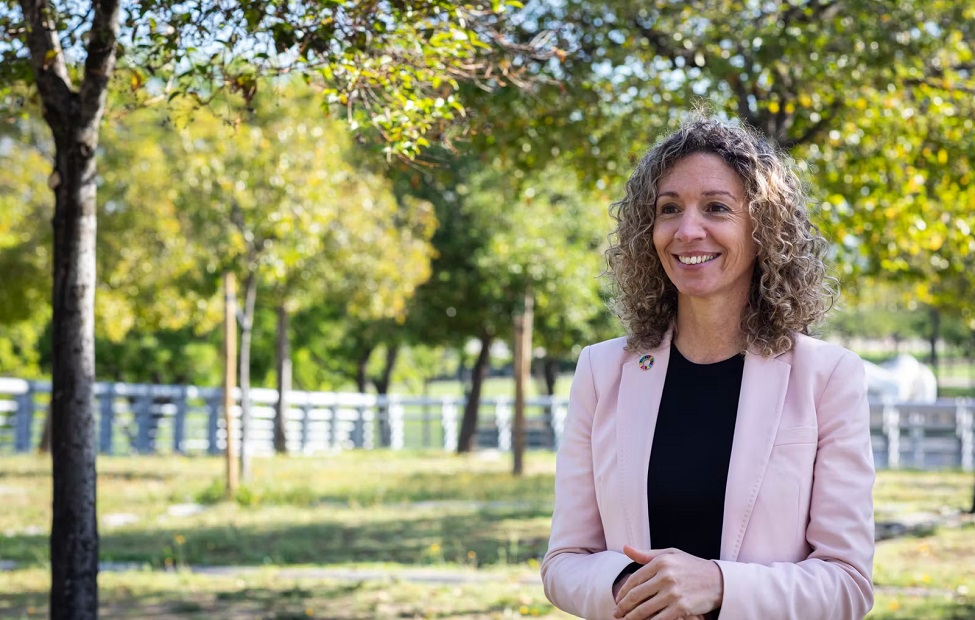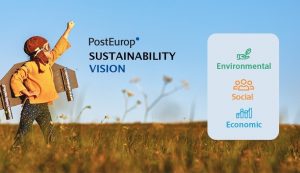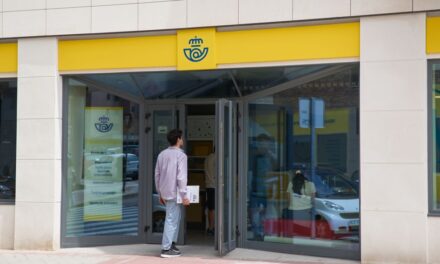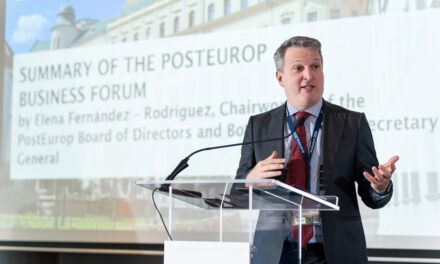
A Three-dimensional perspective on postal sector sustainability

Post & Parcel speaks to Elena Fernández Rodríguez, Chairwoman of the Board of Directors at PostEurop on why the sector should embrace a broader view of sustainability.
You started your new role at PostEurop in January – what excites you about your job?
 I’m really happy taking on this new role because it’s a very challenging and interesting time for the sector. To be in a leadership position, you need a very holistic view of all the pressures – the risks and opportunities that the postal operators are currently facing. I have been the European Affairs Committee Chair at PostEurop for 7 years, so I am already familiar with the sector from a transversal perspective. Over the years I have built strong relations with members and different stakeholders, strengthening my holistic view of the sector; thus I am in a good position to take the sector forward. It is really important for me to feel that I am doing something to help the sector be in a better position and this new role is all about change and resilience.
I’m really happy taking on this new role because it’s a very challenging and interesting time for the sector. To be in a leadership position, you need a very holistic view of all the pressures – the risks and opportunities that the postal operators are currently facing. I have been the European Affairs Committee Chair at PostEurop for 7 years, so I am already familiar with the sector from a transversal perspective. Over the years I have built strong relations with members and different stakeholders, strengthening my holistic view of the sector; thus I am in a good position to take the sector forward. It is really important for me to feel that I am doing something to help the sector be in a better position and this new role is all about change and resilience.
What are your aspirations for postal sustainability?
My objective is to position PostEurop and postal operators as front runners in sustainability – because we are! We have been working towards some really ambitious targets since 2009 – investing in sustainability for more than a decade and we have a very wide approach to sustainability solutions. Sustainability is mainly thought of as an environmental issue, but we want to provide a broader, three-dimensional perspective of the concept. PostEurop members, as companies entrusted with the obligation of providing the universal postal service, share a public service vocation and have been committed to delivering a positive social impact of our business and society for centuries. Not only have we made huge efforts to reduce the impact we have on the environment, but also we are trying to be sustainable from an economic point of view, which we believe is key to ensure the quality of our service to citizens.
Can you tell me more about this three-dimensional perspective?
In PostEurop we believe that there is a need to have a more holistic approach to sustainability and incorporate a three-dimensional perspective that looks for a sustainable future, taking into account the economic impact (and value), the social impact and the environmental impact.
PostEurop and its members place sustainability at the core of their actions. On the environmental side, we are fully aligned with the EU objectives of achieving a significant reduction of Greenhouse gas (GHG) emissions by 2030 and to become climate-neutral by mid-century, with special emphasis on reducing emissions generated by buildings and transport activities. In addition to our fleet transformation strategies, at the core of last mile delivery decarbonisation, we also bet for circular economy solutions and a zero waste value chain and for increasing the use of renewable energy in buildings and fostering energy efficiency policies. We are also designing products and services adapted to sustainability needs of customers and enhancing transparency and reporting on our environmental impact.
But postal operators also generate social value by ensuring social and economic cohesion through our network and services. From a social point of view, in the EU we employ more than 1.1 million people, half of which are women. 60% of the workforce is dedicated to the delivery of goods and letters .Of course, all of us have very strong governance models that allow us to behave in a very ethical way and to respect and promote diversity in our companies.
Besides, from an economic perspective, postal operators play an essential role in the single market by promoting economic growth, social cohesion and inclusion, as well as enhancing rural areas development, keeping all territories connected. We connect every day 800 million people and businesses, we handle more than 60 billion items yearly and represent almost 1% of our countries GDP.
How does your work at Correos in the area of sustainability help you with your role at PostEurop?
The field of corporate sustainability is far more complex and technical than you might think, it requires knowledge of many aspects such as regulation, reporting and standards or innovation, and operations. Thus, my role in Correos as responsible for the ESG strategy of the company has shown me that ESG issues are now at the centre of the agenda of our stakeholders and has helped me to be prepared for this new position at PostEurop and for the many interesting debates expected in the coming years.
How is Correos doing in terms of sustainability?
Here are some examples of our sustainability efforts, focused at achieving a triple positive impact (environmental, social and economic): Correos has a team of over 46.000 people, where women represent 52% of employees. In Spain, we have 11,000 people delivering on foot every day, these are zero emissions deliveries. Moreover, we have already more than 2.700 ecologic vehicles, so we have one of the most sustainable delivery systems in the world; in addition, all our parcel delivery and services that we offer in our post offices are CO2 neutral. Last but not least, we foster national economy by connecting people and territories with over 5 million items a day and many proximity services, while we contribute to a stronger national economy by relying almost completely on national suppliers.
You launched PostEurop’s Sustainability Vision at WMX Europe in June – can you explain what it is?
 We started working on this piece of work and collecting data about a year ago when I was the European Affairs Committee Chair, because we realised that we wanted to dig deeper into the sector’s sustainability credentials and be able to improve our visibility on sustainability.
We started working on this piece of work and collecting data about a year ago when I was the European Affairs Committee Chair, because we realised that we wanted to dig deeper into the sector’s sustainability credentials and be able to improve our visibility on sustainability.
We can now show what we have achieved, what our commitments are and what we are currently doing to become more sustainable. For example, we outline the different solutions we are implementing to reduce CO2 emissions, such as parcel lockers and other out of home delivery options, as well as the technology we have invested in to reduce the number of kilometres travelled per route and to increase successful delivery rates in a convenient way for customers.
The vision was very well received by PostEurop members and also by the European Commission, because it helped the EU understand what we have done so far in this area and where our efforts are focused.
Why is the PostEurop Sustainability Vision so unique?
As far as I know, we are one of the only sectors to have done this exercise to collect all the key data and information regarding our impact. My objective in this regard would be to keep going this way, sharing data and best practices among members, being transparent and working towards achieving sustainability in the three dimensions that I mentioned. In the future I hope PostEurop members continue to work together and share best practices and experiences which are useful to achieve their ambitious sustainability targets.
How is the current global economic instability affecting postal operators’ ability or willingness to be more sustainable?
Well, the current context is quite complex and challenging, not only for postal operators, but for all economic sectors in Europe. We have had COVID, the subsequent economic slowdown and the crisis following war in Ukraine – all of this has had an impact on the economy, but our plans have not changed. The war in Ukraine has just shown us that as countries we have to be as independent as possible regarding energy.
We are transitioning towards using more electric vehicles and most postal operators are already doing trials with alternative fuels to the extent possible given the infrastructure and technologies available. In fact, we are more concerned by the economic sustainability of the universal service in the current context.
What do you mean by this?
As I said, we are investing in the development of alternative services, innovative new features and the promotion of efficient delivery of postal items in order to meet evolving social, environmental and economic challenges. By providing sustainable employment and reducing our ecological footprint we are confident we can create solutions that meet our customer needs both today and in the future.
Nevertheless, we operate in a very competitive market, with increasing regulatory pressure and a significant decline of the letter mail volumes. Besides, COVID, inflation and the war on Ukraine have put more pressure on our sector and the society as a whole. We consider that in the current context, is key to maintain the universal postal service with a special focus on vulnerable groups at least for the next decade and it is vital to guarantee the (economic) sustainability of the USO.
Do you think the sector is being ambitious enough in terms of sustainability?
 I think we need to have ambitious sustainability targets, but we also have to be realistic. We are going through challenging times and while the transition is urgent, we also have to be sure that we are able to achieve the targets we set ourselves as well as those imposed by legislation. It is important not to oversell and to balance ambition with the actual ability to transform our businesses given the available resources.
I think we need to have ambitious sustainability targets, but we also have to be realistic. We are going through challenging times and while the transition is urgent, we also have to be sure that we are able to achieve the targets we set ourselves as well as those imposed by legislation. It is important not to oversell and to balance ambition with the actual ability to transform our businesses given the available resources.
For example, IPC [International Postal Corporation] set some ambitious CO2 emissions reduction targets in 2009 with some of the IPC members . And we were able to achieve the targeted reduction of CO2 emissions 10 years ahead of schedule. Then, we updated our objectives to be a little bit more ambitious. Is a learning process
At PostEurop we are aligned with the environmental objectives set by the Paris Agreement and the European Commission, which are already quite ambitious, and our members are already implementing operational adjustments to comply with them.
What are the targets?
Within the Green Deal the EC has set a target for Europe to become the first climate neutral continent by 2050. The Climate target plan and its implementing regulatory package (Fit for 55) aims at reducing GHG emissions by at least 55% in 2030 compared to 1990 levels; and most recently the EU even increased the 55% reduction target to 57%. Besides, within the Sustainable and Smart Mobility area, the current legislative cycle has brought a great number of regulatory initiatives with the final objective of reducing GHG emission reduction from transport up to 90% by 2050. PostEurop members are fully committed and heavily investing in order to reach these targets.
Are all postal operators environmentally conscious or is there still work to be done to encourage this mindset?
I think that in general, all companies are very conscious about their impact. But, of course, there are some postal operators that are more advanced than others in their environmental transition journey. And it’s also an issue of resource availability. Many countries have been working on reducing their environmental impact and investing in new technologies for sustainable deliveries for some years already, others are starting that process.
However, the mindset and the awareness regarding the need of speedy adaptation and to reduce our environmental footprint is now omnipresent. On a more global level, the Universal Postal Union is also working towards common sustainability targets for the whole postal industry, which I expect to broaden ambition on climate action.
Can you tell me about the Green Mobility Forum you recently held?
Last week in Tallinn, PostEurop held the Green Mobility Forum, together with the Environmental Working Group with countries participating all over the European Union and Europe – from Belgium to Serbia. During the forum, postal operators shared s how they are transforming their companies for the good and what kind of green strategies they are bringing in.
Some years ago, when we used to talk about sustainability, the only people in the room were experts in sustainability, whose job titles were closely related to it; nowadays there are people joining the discussion from very different departments: operations, procurement, finance… – in fact, anyone responsible for taking decisions and ensuring the company has a positive impact.
It was a very interesting meeting and encouraging to see hear stories from postal operators from different countries, different geographic areas and of different sizes. While some of the companies were private and some are public, we are all working towards the same goal.
Were there any projects discussed at the Green Mobility Forum which stood out to you?
The meeting was a great opportunity for best practice sharing. For instance, Serbia Post made a very inspiring presentation and shared their strategy regarding mobility and environmental footprint reduction. It was amazing to see how they have already incorporated some electric vehicles and have set ambitious decarbonisation targets. It showed how outside of the EU, postal operators are also investing and transforming their business models to reduce their environmental footprint and their energy consumption while integrating circular economy principles in every step of the value chain.
Other examples, now from EU countries were bpost , the Belgian post, who shared their experiences trying reusable packaging, as well as their “Ecozone” areas project with zero emission deliveries; or Omniva, the Estonian post, who explained a couple of ongoing pilots such as parcel lockers with solar panels in their rooftops and zero emission self-driving vehicles. It was very stimulating to see how posts incorporate different innovative solutions in their pursuit of sustainability.
I’ve heard you say before that we need to switch from a customer centric approach to a planet centric approach. Is that something the industry needs to focus on?
I’m still convinced that we have to be planet-centric. We are already experiencing how the climate change is impacting posts around the globe. There are floods, extreme weather events and heatwaves which are putting our operations and our people at risk.
I think we have to keep customer demands and expectations in mind while integrating the planet as a key “stakeholder” in our business strategies. Indeed, the planet is very important for us and we try to minimise any negative impact our activity may cause on it.
What is the industry doing to address this?
The sector is already working on this. But of course, we could do more, we have to do more. I think it’s very important also to make the customer aware of their of the impact of their decisions and for them to get to the point of agreeing to pay a little bit more for a sustainable service. For me, the challenge is to change consumers habits. Because we need that systemic change to happen. The way we currently consume, we would need two and a half planets not to be overexploiting its resources . So we need this change as a society.
I believe enabling this change is all about teamwork. Essentially, the customer will not exist if the planet doesn’t exist. So I think we have to be able to monetise our impact, in this case, the positive impact posts generate trough investing in decarbonisation and sustainable services. Our sector is very dynamic but there is also a great pressure on prices. Net Zero deliveries are not for free. It’s very difficult to deliver an express item at zero emissions. So people often want prices to be lower, but we need to strike the right balance and raise awareness on how much the delivery costs the customer and how much it costs the planet.
What drives you in your role?
I was thinking about this today when I was coming to the office. I have five kids and I do a lot of travelling for conferences and meeting, so sometimes it can be challenging. But for me, it is essential to feel like I’m helping to change the world, to leave my kids a better future. Today, sustainability covers around 85% of my work agenda. This is good because it gives me a purpose. I would like to leave a green legacy, to be able to contribute to the change we need. Some postal operators are having a huge impact on society, but we cannot deny the impact on the environment; I’m trying to help companies reflect on that impact, engage with the transformation and take action towards a more sustainable postal future.
To download PostEurop’s Sustainability Vision visit: https://bit.ly/3EEleNA












